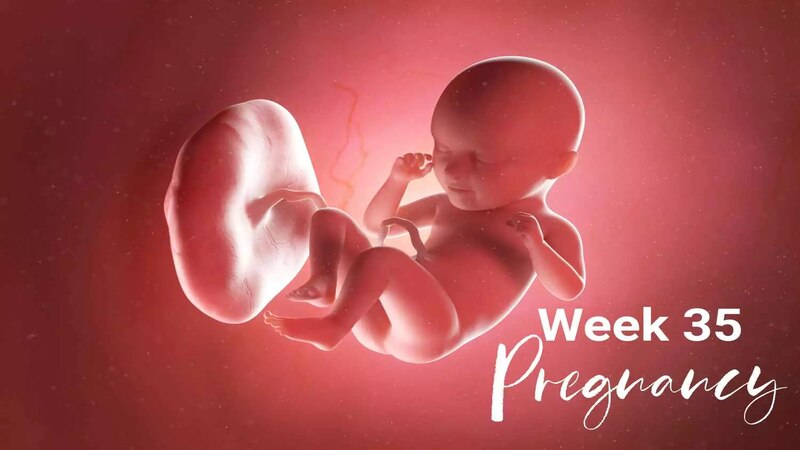
The last few weeks of pregnancy may seem to go very slowly. You are eager to meet your little one and the days seem to just drag on. However, you cannot say the same about yourself, both physically and mentally. Your body and mind are undergoing a lot of changes to gear up for motherhood. While physical fatigue and discomfort will keep increasing, you may feel your moods changing quickly too. The hormones are fluctuating and can impact your daily life in many ways. Let’s get into the details of how does your body change during week 35 of pregnancy.
How Does Your Body Change During Week 35 of Pregnancy?
Here are a few changes you may notice in week 35 of pregnancy, in addition to all those changes in the last few weeks.
1. Pelvic Numbness
Pelvic numbness during pregnancy is due to the compression of your small nerve around the pelvic area. As the baby grows and gains weight, the strain on your pelvis can increase. The increase in your body weight can also add to this strain and cause compression of the small nerve in the front of your hips.
Pregnancy releases relaxin, a hormone responsible for relaxing the joints and pelvic opening, which can also cause pinching of the nerves. Your body will also retain more fluid at this stage of pregnancy, which can again compress your nerves. You may feel the numbness on certain patches of skin on the thighs and not the entire pelvis. Sitting in certain positions and making certain movements can increase the pressure, thus triggering numbness. In very rare cases, the numbness may persist.
What to do
Try changing your position when sitting or lying down. You can consult your doctor and do gentle prenatal yoga or exercise to reduce fluid retention in your joints. Avoid staying in the same position for too long. Try to move a little from time to time to promote blood flow.
2. Varicose Veins
The increasing blood flow and pressure in your veins can restrict smooth blood flow, resulting in bulging veins. Varicose veins are common in the last few weeks of pregnancy. If you are not eating enough fiber, your body can retain more fluids, which can increase the chances of varicose veins.
What to do?
Avoid standing for long periods. Keep a chair or stool next to you and take multiple breaks if your work involves a lot of standing. You can also try massaging the affected areas with warm water or using hot packs. Eating a fiber-rich diet and exercising regularly can help reduce fluid retention in the body.
3. Clumsiness
As your body grows in size and increases in weight, your center of balance will shift. It will not only make it harder to walk or move quickly; it can also make you clumsy. Being clumsy during pregnancy has nothing to do with who you are personally; it is just the physical changes your body is going through.
If you are experiencing joint pain and swollen fingers, you may drop things frequently. It can be difficult to pick or lift things, too. The increase in size can also affect your judgment of spatial awareness.
What to do?
Reduce your speed. Move slowly and consciously. If lifting things gets difficult, reduce the weight. Do not get flustered or be too hard on yourself. Getting agitated can make it worse. So, take a deep breath and ask for help if you need it. Don’t try to do it all by yourself.
4. Frequent Urination
As the baby’s weight starts descending, getting ready for childbirth, the pressure on your uterus and bladder will increase. Your bladder’s capacity will also decrease due to the lack of space. Your kidneys are also working harder to process all the extra fluids in your body. As a result, you may want to urinate frequently.
What to do?
Walking to and from the toilet with all the add-on weight can be difficult. So, if you are working at an office, try to see if you can change your place and move closer to the toilet. Try maintaining a schedule to use the toilet to avoid the last-minute rush.
5. Other Symptoms
Some of the other symptoms you may continue to experience in your 35th week of pregnancy are:
- Enlarged breasts
- Skin dryness/rashes
- Digestion problems/constipation
- Edema: swelling in feet and ankles
- Hemorrhoids
- Insomnia
- Stretch marks
- Bleeding gums
- Pregnancy brain.
As your pregnancy progresses into the last few weeks, your body can show visible signs of strain and exhaustion. You may or may not experience these symptoms but that does not say anything about your pregnancy. It is okay to experience these symptoms differently and there is nothing to worry about unless your doctor says there is.
Happy Pregnancy!
Read Also: How Does Your Body Change During Week 36 of Pregnancy?
